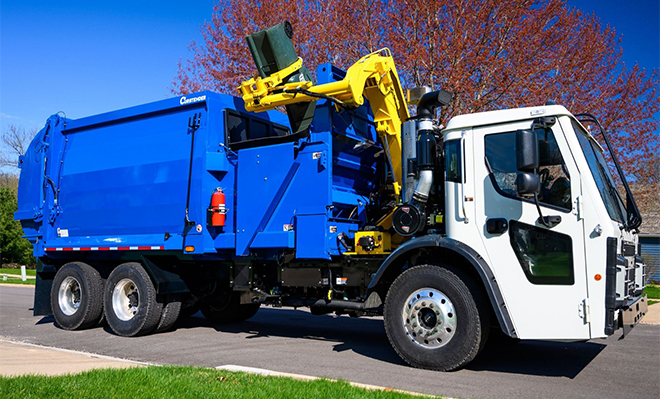Waste haulers have been experimenting with various types of alternative-fuel vehicles for years. As a recent article in Transport Dive reports, major public companies including Waste Management, Waste Connections and Republic Services, as well as private haulers such as Recology, and some municipally run fleets, have tested various types of EVs, as well as other options, such as CNG. However, the new year has brought a new wave of deals to electrify refuse trucks, encouraged by the Biden administration’s enthusiasm for EVs, along with the boom in EV-makers going public.
“We are seeing this acceleration in piloting activity. We are seeing a proliferation of competitive offerings, and partnerships between incumbents and established companies, between startups and other startups—a very rich constellation,” Noah Kaye, a Senior Research Analyst at Oppenheimer & Co, told Transport Dive. “Ultimately, this is all positive for adoption trends in the industry, because the more and more solutions there are, certainly the more investment that’s brought to bear, lowering the costs, the quicker the adoption curve will be for the industry.”
One of the companies taking advantage of the SPAC trend is battery-maker Romeo Power, which counts Republic Services COO Tim Stuart among its board members. The two companies recently announced a strategic alliance under which two Republic refuse collection vehicles will be retrofitted with electric motors and Romeo battery packs. The companies will explore more applications for Romeo’s technology in Republic’s fleet of 16,000 vehicles.
In December, Republic ended a partnership with Nikola Motor, canceling a potential order for up to 5,000 electric collection vehicles. Republic cited unexpected costs and longer-than-anticipated development time as the reason for the split.
Romeo also recently signed a $234-million, five-year production contract with Lion Electric, as well as a deal with Heritage Environmental Services, which plans to purchase 500 battery-electric vehicles.
“Our fleet manager partners, Heritage and Republic, they realize that the key differentiating factor to electrification is the battery. And that’s why they partner directly with us,” said Romeo CEO Lionel Selwood Jr.
XL Fleet, another newly-public fleet electrification specialist, has partnered with Iowa-based refuse truck OEM Curbtender to develop battery-electric and plug-in hybrid electric commercial trucks for use in waste management.
XL Fleet believes that the $7-billion refuse truck segment is just now achieving the right balance of factors such as power, weight, range and cost. “There are some very demanding aspects of refuse collection—combine that with how high the costs of the systems have been and that’s really what’s been limiting adoption,” said XL Fleet CEO Dimitri Kazarinoff, adding that there is now “a lot of pent-up demand.”
Curbtender CEO Kevin Watje also sees a lot of potential in the market. “Our customer base has been very eager [for] electric trucks. We could have sold perhaps hundreds of trucks already had we just had an electric vehicle that would integrate properly and work for our body.”
Source: Transport Dive

how to buy lasuna – lasuna tablet himcolin online buy
besifloxacin oral – buy carbocysteine tablets buy sildamax without a prescription
buy neurontin without a prescription – buy neurontin tablets sulfasalazine 500 mg us
probenecid for sale online – benemid 500 mg usa tegretol 200mg brand
colospa 135 mg tablet – buy pletal pills for sale order cilostazol 100mg without prescription
purchase celecoxib for sale – buy urispas no prescription buy generic indomethacin 50mg
purchase cambia sale – buy aspirin 75mg generic aspirin 75mg ca
rumalaya oral – purchase rumalaya pills elavil 50mg over the counter
buy pyridostigmine – sumatriptan ca imuran 25mg ca
buy diclofenac pill – order generic nimotop order nimotop online cheap
brand mobic – order toradol 10mg online cheap toradol over the counter
generic cyproheptadine 4 mg – tizanidine 2mg price zanaflex cost
purchase trihexyphenidyl online – buy generic trihexyphenidyl how to order voltaren gel
buy generic accutane 10mg – deltasone order oral deltasone 5mg
cefdinir cost – omnicef uk cleocin online order
order deltasone generic – how to get permethrin without a prescription zovirax for sale
acticin drug – benzoyl peroxide drug order retin gel
metronidazole 200mg for sale – buy generic cenforce buy generic cenforce
betnovate 20 gm without prescription – betamethasone 20 gm brand buy benoquin
augmentin 625mg ca – augmentin 1000mg without prescription levothroid over the counter
cost clindamycin – buy cleocin generic indocin usa
buy generic cozaar over the counter – buy generic cozaar cephalexin over the counter
buy crotamiton online cheap – purchase aczone pills order aczone online
order zyban online – buy generic orlistat online shuddha guggulu for sale online
order provigil for sale – order provigil 200mg pill purchase meloset online
purchase prometrium generic – how to buy progesterone buy fertomid generic
aygestin sale – buy cheap lumigan yasmin online
estrace order – buy cheap ginette 35 brand arimidex
г‚·гѓ«гѓ‡гѓЉгѓ•г‚Јгѓ«йЂљиІ©гЃЉгЃ™гЃ™г‚Ѓ – シルデナフィルジェネリック йЂљиІ© シアリス処方
eriacta later – sildigra pose forzest dog
order crixivan generic – finasteride tablet buy diclofenac gel online
valif online gallop – cheap sustiva sinemet order online
buy provigil – buy modafinil online buy lamivudine for sale
ivermectin 3mg tablets – ivermectin 12mg tablet tegretol online order
buy promethazine 25mg pill – buy ciprofloxacin without a prescription cost lincomycin 500mg
deltasone 10mg for sale – starlix order online order captopril sale
accutane pills – cheap zyvox buy zyvox 600mg without prescription
amoxicillin over the counter – buy valsartan 160mg online cheap order ipratropium 100mcg generic
zithromax 250mg without prescription – order tindamax generic buy bystolic 5mg online cheap
prednisolone usa – prednisolone 40mg price buy prometrium 200mg without prescription
purchase gabapentin generic – buy itraconazole 100 mg sale sporanox price
lasix price – betamethasone 20 gm cost3 buy generic betnovate
buy cheap clavulanate – order ketoconazole generic purchase cymbalta pill
augmentin 375mg cost – nizoral oral cymbalta 20mg brand